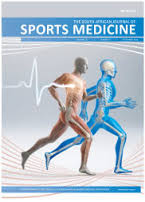Prevalence and associated factors with mental health symptoms among semi-professional cricket players after the resumption of sporting activities following an extensive lockdown
DOI:
https://doi.org/10.17159/2078-516X/2023/v35i1a15058Abstract
Background: Mental health of cricket players has been a topic of debate for a considerable time across the globe.
Objectives: The purpose of this study was to investigate the prevalence of mental health symptoms among semi-professional male cricket players experienced during COVID-19, as well as the relationship between age and the Depression, Anxiety, Stress Scale (DASS-21) sub-scale.
Methods: Mental health symptoms were assessed among cricket players (n = 90) using the following instruments, respectively: Depression, Anxiety, Stress Scale – 21 (DASS – 21); Athlete Burnout Questionnaire (ABQ) and Satisfaction with Life Scale (SWLS). Descriptive (means ± standard deviations) and inferential (Spearman’s correlations) statistics were calculated using SPSS (IBM Version 27.0) at a significance level of p < 0.05.
Results: The study reported that 5.6% (n = 5) of cricketers believed life was futile, and 10% (n = 9) thought they were useless most of the time. However, on the anxiety sub-scale, 27% (n = 24) of cricketers indicated low confidence. In addition, 23% (n = 21) of cricketers reported being stressed. Spearman's correlations revealed a positive and significant association between the DASS-21 sub-scales and that cricketers' DASS-21 sub-scale symptoms are unrelated to age.
Conclusion: The study found that there were moderate levels of anxiety, a reduced sense of achievement and a neutral feeling towards satisfaction with life. Reducing mental health symptoms would extend the playing careers of cricket players. De-stigmatising mental health may result in more robust and accurate self-reports of mental health illness among elite athletes, which can enable sustainable change.
Downloads
Downloads
Published
Issue
Section
License
Copyright (c) 2023 South African Journal of Sports Medicine

This work is licensed under a Creative Commons Attribution 4.0 International License.
The South African Journal of Sports Medicine reserves copyright of the material published. The work is licensed under a Creative Commons Attribution 4.0 (CC BY 4.0) International License. Material submitted for publication in the South African Journal of Sports Medicine is accepted provided it has not been published elsewhere. The South African Journal of Sports Medicine does not hold itself responsible for statements made by the authors.
How to Cite
- Abstract 552
- PDF 443






.png)